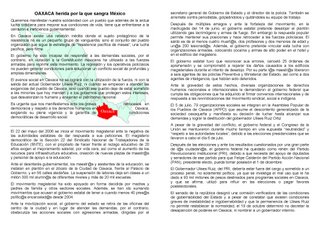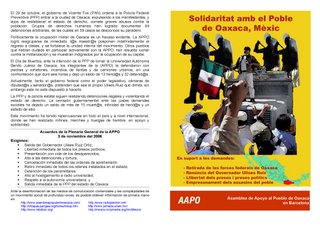Versión también en Inglés
Oaxaca, wound through which Mexico bleeds
We want to show our solidarity with a people who on top of their tough daily struggle to better living conditions have to face the government thick headedness and inefficiency.
An unknown rebellion exists in Oaxaca where the protagonist subject of the resistance is not a small vanguard group but the gathering of the organized people who continue the strategy of “peaceful resistance of the masses”, a peaceful but firm struggle.
The government has been incapable of responding to the social demands and in fact in violation of the Mexican Constitution has used the armed forces to repress this movement. The repression and the police operations cannot create conditions that solve a social conflict of such deep and wide dimensions.
Social advance in Oaxaca will not be achieved with the use of force, neither with the resignation of the current Governor Ulises Ruiz, nor when the demands of the people of Oaxaca begun to be heard. It will only be achieved when these people stop being subject to the ruling minority and the governments that protect those interests, that devalue what is human and alienate the national patrimony.
It is urgent that we protest these grave setbacks in democracy and respect of human rights in Oaxaca, demanding their full implementation and the guarantee of democratic conditions for social development.
On May 22nd, 2006 the teachers’ movement began due to the lack of response on the part of the state authorities to their demands. The democratic teachers movement of the Section 22 of the National Teachers Union of Education (SNTE), with the goal of confronting the 20 year old education lag demanding a better wage, POR VIDA CARA as well as an increase in resources for educational infrastructure, the creation of more teaching positions as well as support personnel in education.
Facing the government’s disinterest, the teachers and education assistants set up a camp in the central plaza (zocalo) in Oaxaca City in front of the City Hall and in 56 surrounding streets. The suspension of work left one million 300 thousand students and more than 20 thousand schools without classes.
The teachers’ movement has been supported by mothers and fathers as well as many other social sectors. Moreover different movements have joined in that accuse the state government of incarcerating at least 40 political prisoners since 2004.
In response the social movement, the state government has taken away its offices from the center of the city and instead of attending to the demands has set up obstacles to the social actions with armed aggressions directed by the secretary general of the State Government and the police director. It has also attacked journalists, beating them and taking away their work tools.
After multiple threats and in response to the strength of the movement, at dawn on June 14th the State Government tried to evacuate the sit-in using tear gas and fire arms. Even so the popular resistance maintained their positions and made the police forces retreat. The result was the death of at least 4 people, two teachers and 2 minors and about 200 wounded. Moreover the government tried to link this movement with armed organizations, placing cocaine and arms in the teachers’ hotel and building.
The State Government had to recognize its errors and cancelled 25 arrest warrants and promised to repair damages caused to the buildings during the evacuation attempt. The teachers liberated 6 police agents of the Preventative Police and Ministerial Police of the State, as well as 2 intelligence agents that they had detained.
Facing the seriousness of the events, diverse national and international human rights organizations demanded that the federal government fulfill its obligations acquired when signing international conventions and in response to the demands of the union, social, and indigenous movements.
On July 5th, 79 social organizations integrated into the Popular Assembly of the Peoples of Oaxaca (APPO) that united over the general discontent of the Oaxaca society and manifested its decision to struggle until reaching their demands and achieving the resignation of the governor Ulises Ruiz Ortiz.
In spite of the graveness of the conflict, the federal government and the Congress of the Union maintained for a long period of time a supposed “neutrality” and “respect of the local authorities”, due to the presidential elections that took place on the 6th of July.
After the elections and in light of the results questioned by a very significant part of the citizens, the federal government has become prisoner hostage of the Institutional Revolutionary Party (PRI) as the support of the delegates and senators of this party is needed in order for Felipe Calderon of the National Action Party (PAN), elected president, to take power on December 1st.
The Governor Ulises Ruiz of the PRI should not be in power and should be subject to a penal process as well as a political process, as there is an investigation of his wrongful use of 93 billon pesos earmarked for social programs in Oaxaca and it is affirmed that they were used to influence elections or pay post electoral favors.
The Senate of the Republic appointed a truth finding commission to investigate the governing conditions of the State and in spite of proving the existence of serious conditions of instability and lack of ability to govern and that the stay of Ulises Ruiz does not permit the establishment of normality, on the 19th of October the Senate decided not to carry out the change of power in Oaxaca nor install an acting governor.
We want to show our solidarity with a people who on top of their tough daily struggle to better living conditions have to face the government thick headedness and inefficiency.
An unknown rebellion exists in Oaxaca where the protagonist subject of the resistance is not a small vanguard group but the gathering of the organized people who continue the strategy of “peaceful resistance of the masses”, a peaceful but firm struggle.
The government has been incapable of responding to the social demands and in fact in violation of the Mexican Constitution has used the armed forces to repress this movement. The repression and the police operations cannot create conditions that solve a social conflict of such deep and wide dimensions.
Social advance in Oaxaca will not be achieved with the use of force, neither with the resignation of the current Governor Ulises Ruiz, nor when the demands of the people of Oaxaca begun to be heard. It will only be achieved when these people stop being subject to the ruling minority and the governments that protect those interests, that devalue what is human and alienate the national patrimony.
It is urgent that we protest these grave setbacks in democracy and respect of human rights in Oaxaca, demanding their full implementation and the guarantee of democratic conditions for social development.
On May 22nd, 2006 the teachers’ movement began due to the lack of response on the part of the state authorities to their demands. The democratic teachers movement of the Section 22 of the National Teachers Union of Education (SNTE), with the goal of confronting the 20 year old education lag demanding a better wage, POR VIDA CARA as well as an increase in resources for educational infrastructure, the creation of more teaching positions as well as support personnel in education.
Facing the government’s disinterest, the teachers and education assistants set up a camp in the central plaza (zocalo) in Oaxaca City in front of the City Hall and in 56 surrounding streets. The suspension of work left one million 300 thousand students and more than 20 thousand schools without classes.
The teachers’ movement has been supported by mothers and fathers as well as many other social sectors. Moreover different movements have joined in that accuse the state government of incarcerating at least 40 political prisoners since 2004.
In response the social movement, the state government has taken away its offices from the center of the city and instead of attending to the demands has set up obstacles to the social actions with armed aggressions directed by the secretary general of the State Government and the police director. It has also attacked journalists, beating them and taking away their work tools.
After multiple threats and in response to the strength of the movement, at dawn on June 14th the State Government tried to evacuate the sit-in using tear gas and fire arms. Even so the popular resistance maintained their positions and made the police forces retreat. The result was the death of at least 4 people, two teachers and 2 minors and about 200 wounded. Moreover the government tried to link this movement with armed organizations, placing cocaine and arms in the teachers’ hotel and building.
The State Government had to recognize its errors and cancelled 25 arrest warrants and promised to repair damages caused to the buildings during the evacuation attempt. The teachers liberated 6 police agents of the Preventative Police and Ministerial Police of the State, as well as 2 intelligence agents that they had detained.
Facing the seriousness of the events, diverse national and international human rights organizations demanded that the federal government fulfill its obligations acquired when signing international conventions and in response to the demands of the union, social, and indigenous movements.
On July 5th, 79 social organizations integrated into the Popular Assembly of the Peoples of Oaxaca (APPO) that united over the general discontent of the Oaxaca society and manifested its decision to struggle until reaching their demands and achieving the resignation of the governor Ulises Ruiz Ortiz.
In spite of the graveness of the conflict, the federal government and the Congress of the Union maintained for a long period of time a supposed “neutrality” and “respect of the local authorities”, due to the presidential elections that took place on the 6th of July.
After the elections and in light of the results questioned by a very significant part of the citizens, the federal government has become prisoner hostage of the Institutional Revolutionary Party (PRI) as the support of the delegates and senators of this party is needed in order for Felipe Calderon of the National Action Party (PAN), elected president, to take power on December 1st.
The Governor Ulises Ruiz of the PRI should not be in power and should be subject to a penal process as well as a political process, as there is an investigation of his wrongful use of 93 billon pesos earmarked for social programs in Oaxaca and it is affirmed that they were used to influence elections or pay post electoral favors.
The Senate of the Republic appointed a truth finding commission to investigate the governing conditions of the State and in spite of proving the existence of serious conditions of instability and lack of ability to govern and that the stay of Ulises Ruiz does not permit the establishment of normality, on the 19th of October the Senate decided not to carry out the change of power in Oaxaca nor install an acting governor.









